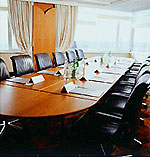Russia hopes to bring offshore business back to Russia

MOSCOW. Feb 11 (Interfax) – The Russian Presidential Experts Directorate has compiled several measures aimed at de-offshorization of the Russian economy, the head of the directorate, Ksenia Yudaeva, said.
As well as privatization inside Russia, reforming regulations for investing pension savings and easing the tax regime for investors, the measures suggested include the creation of a special arbitration court and the investment of some reserve funds in the Russian stock market.
“An idea came up, which we support, to set up a special court, an international arbitration center within the framework of the Customs Union,” she said at a briefing Friday.
The best international arbitrators will be invited to this court, she said. It should be a structure in which there is a great level of confidence and a center aimed at improving practices inside Russia.
“We are now working on how exactly such a court could be set up. Clearly there is a need for simplified procedures for recognizing the rulings of this court in the territory of the Customs Union countries. The rulings should automatically be recognized in the territory of the Eurasian Union,” Yudaeva said.
The court could hear financial disputes associated with the circulation and use of securities and so on, she said.
Investment of sovereign funds in the Russian stock market is also being widely discussed. “The question is whether there is a need to invest some Russian sovereign fund resources on the Russian trading floor, which is also debatable. In international practice sovereign funds invest in their own markets very actively,” she said. A Russian financial agency “will be created now. Clearly, there are risk management issues but we can talk about investing some percentage in the financial market.”
Yudaeva spoke about the target indicators for de-offshorization that the directorate wants to see achieved. Thus, in 2015 50% of pension savings and 15% of reserve fund resources should be invested in shares on the Russian stock market. The share of the local market in overall Russian share trading should at least climb from 50% in 2011 to over 90% in 2015. Also in 2015 the Russian market should see around 50% of the placements from CIS companies (no placements in 2011).
There is an alarming trend being observed at the moment, Yudaeva said. “We are seeing business leave Russian jurisdiction. Mostly, property is being registered in foreign jurisdictions and deals are made using foreign capital markets, foreign judicial systems are being used more and more,” she said.
Russia is the leading emerging economy in terms of business flight away from national jurisdiction. From 2002 to 2012, 40 Russian companies floated their shares totaling around $14 billion solely abroad, and of the biggest three IPOs of 2012 none took place in Russia.
Between 2010 and 2012 80% of Russian company share placements were made abroad. In Brazil the figure was 7%, in China – 8%, in India – 14% and in South Africa – 29%.
Yudaeva also said that Russian companies account for 18% of the share turnover on the London Stock Exchange. An average of 15% of the cases heard by the London Court of International Arbitration concern Russia and the CIS.
President Vladimir Putin spoke about the need for de-offshorization of the economy in his address to the Federal Assembly in December.
